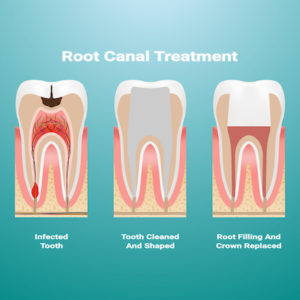It’s an unfortunate fact that many people have a negative reaction to even hearing the phrase “root canal.” They have heard too many horror stories about what a painful procedure it is, and the frightening tools and methods associated with it. However, this perspective is based on how root canals were performed in years past; today’s root canal therapy bears very little resemblance to the traumatic root canals performed years ago. Our dentist, Doctor Ben Massey has years of dental experience.
At Anchorage Dental Group, we take the time to explain to our patients what a truly healing procedure root canals actually are. The goal of a root canal is not only to improve your oral health, but to rid you of chronic pain—not to cause pain. Root canal therapy can be pivotal in saving your natural teeth and avoiding the need for dental prosthetics—like implants, dentures, and bridges—in the future. If you are suffering from an oral infection that’s causing chronic tooth pain, a root canal might be the best treatment option for you.
Root canals are also known as endodontic therapy. Endodontics is a field of dentistry specifically focused on saving natural teeth. All endodontists are dentists, of course, but less than five percent of dentists specialize in endodontics, which requires years of extra education and training.
The specialized training that endodontists receive gives them a great deal of knowledge of innovative, cutting-edge techniques that help them diagnose and treat chronic or excessive tooth pain, and how to deal with the serious infections which are often to blame for this pain.

Root canals address badly damaged teeth in which the pulp of the tooth has become damaged by a severe infection. Typically, the pulp of your teeth is protected by your tooth’s enamel and hard tissue exterior. That means that infections and decay don’t usually affect the sensitive pulp, where there are blood vessels and nerve endings.
Unfortunately, if the hard exterior of your tooth is damaged enough, whether from trauma or decay, an infection can take root in the pulp of your tooth. This can result in extreme pain, but even worse, the infection can spread through your gums and the surrounding tissue, even into your jaw bone. These infections can actually cause the bone itself to degrade.
In order to avoid serious long-term consequences—not to mention severe illness, or even death—early detection and aggressive treatment is often required.
Unlike many other infections in the body, antibiotics are simply not enough to combat this type of infection due to the unique structure of the mouth. An endodontist will need to actually access the pulp and roots of your tooth in order to remove the infected tissue. After carefully drilling into the tooth to expose the infected pulp, the endodontist will remove the damaged tissue, clean out the resulting space, and fill it in.
While severe pain from infection is often a sign that you need a root canal, there are many other more subtle signs that many patients miss. It’s important that you have regular dental checkups so that your dentist can look for early signs of infection you might not be aware of. After all, it’s important to catch these types of infections as soon as possible in order to ensure the best possible outcome and save the tooth. If you wait until there is noticeable decay or excessive pain, it may be too late for root canal therapy to save your tooth.
Root canal therapy can be one of the most beneficial healing procedures available if you are suffering from an infection in your tooth, whether or not you are already experiencing pain. If you are between checkups, keep an eye out for the following signs that you might need a root canal:
The cost of your root canal will vary depending on the location of the tooth and other factors. On average, root canals range from $1,200 to $1,800 in Anchorage. If you believe you may need a root canal or other dental procedure, call Anchorage Dental Group today!